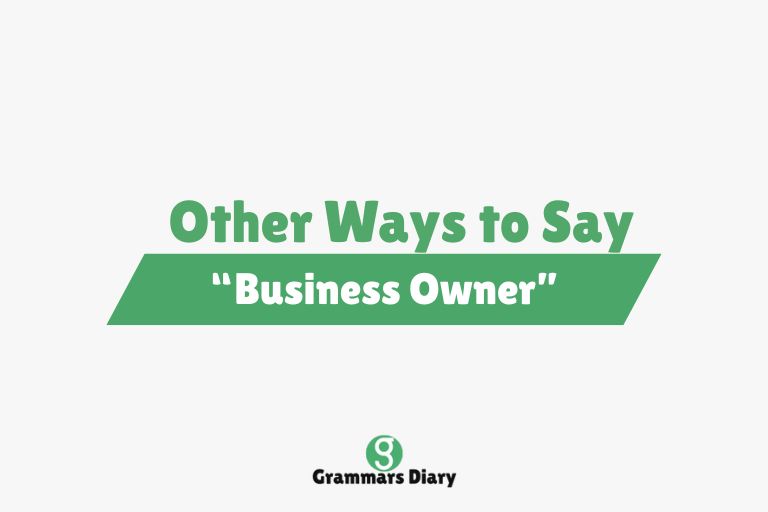“Business owner” is a widely accepted term used to describe someone who has established, runs, or holds ownership of a business. Whether it’s a small local bakery or a fast-growing tech startup, calling someone a “business owner” acknowledges their role in managing and leading an enterprise. However, in professional communication, writing, or even networking contexts, using the same term repeatedly can sometimes sound monotonous or overly general.
Fortunately, there are many other expressions and job titles that can convey the role of a business owner, each with its own subtle shade of meaning and formality. This article offers a comprehensive look at alternative ways to describe someone who owns or operates a business—providing you with a richer vocabulary and the flexibility to choose the best-fit term for any context.
Other Ways to Say “Business Owner”
Here are 25 meaningful alternatives to the term “business owner,” with each entry providing an example sentence, a clear meaning, and appropriate usage contexts.
1. Entrepreneur
Example: “As an entrepreneur, she built her skincare brand from the ground up.”
Meaning: Someone who initiates, develops, and operates a new business, often characterized by innovation and risk-taking.
Usage: Common in startup culture and often used to highlight creativity and initiative.
2. Founder
Example: “He’s the founder of a nonprofit organization that helps underserved communities.”
Meaning: A person who establishes an organization or business, typically from scratch.
Usage: Best used when highlighting the originator of the business.
3. Co-Founder
Example: “As co-founder of the firm, she helped shape the company’s mission and culture.”
Meaning: A person who shares in the creation of a business with one or more others.
Usage: Particularly relevant in joint ventures or partnerships.
4. Proprietor
Example: “The proprietor of the café takes pride in sourcing locally grown ingredients.”
Meaning: A person who legally owns a business, especially a small one.
Usage: Often used for sole proprietorships or traditional establishments.
5. Sole Proprietor
Example: “As a sole proprietor, he handles everything from customer service to bookkeeping.”
Meaning: An individual who owns and runs a business on their own, without partners.
Usage: Useful in financial or legal contexts involving taxes or registrations.
6. Businessperson
Example: “She’s a sharp businessperson with a strong sense for market trends.”
Meaning: A general term for someone engaged in business activities, including owners and executives.
Usage: Suitable for professional profiles and general discussions.
7. CEO (Chief Executive Officer)
Example: “As CEO, he’s responsible for steering the company’s long-term strategy.”
Meaning: The highest-ranking executive in a company, often the owner in smaller businesses.
Usage: Common in formal organizational structures, especially in corporate settings.
8. Managing Director
Example: “The managing director oversees the daily operations of the agency.”
Meaning: A person responsible for managing a company or division.
Usage: Popular in British English and among larger business structures.
9. Self-Employed
Example: “Being self-employed gives her the flexibility to choose her projects.”
Meaning: Someone who works for themselves rather than being employed by another.
Usage: Frequently used for freelancers, consultants, and sole business owners.
10. Operator
Example: “The operator of the food truck handles both cooking and sales.”
Meaning: A person responsible for running the daily activities of a business.
Usage: Often used in service industries or small-scale businesses.
11. Principal
Example: “The principal of the consultancy firm brings over 15 years of industry experience.”
Meaning: A key person in a business, usually the owner or main partner.
Usage: Typically used in law, finance, and consulting firms.
12. Director
Example: “He serves as director of the family-run construction company.”
Meaning: Someone who leads or manages a business or a major department.
Usage: Formal tone; common in registered entities or partnerships.
13. President
Example: “The president of the boutique clothing label also designs many of the pieces.”
Meaning: The head or leader of a company or organization, often with ownership.
Usage: Found in corporate and nonprofit sectors alike.
14. Owner-Operator
Example: “As an owner-operator, she drives her own logistics truck and manages scheduling.”
Meaning: A person who owns and also directly works in the business.
Usage: Common in trades, logistics, and service industries.
15. Company Head
Example: “The company head made the final call on the product launch date.”
Meaning: A broad term for the person in charge of a business.
Usage: Informal but descriptive; good for general writing or media use.
16. Business Founder
Example: “As a business founder, she understands the challenges of building a brand from scratch.”
Meaning: Someone who establishes a business and is often responsible for its initial vision and structure.
Usage: Helpful in bios, websites, or articles when emphasizing the act of creation or initiative.
17. Franchisee
Example: “The franchisee operates several coffee shops under the national brand.”
Meaning: A person who owns and operates a franchise under the guidelines of a larger corporation.
Usage: Specific to franchise business models.
18. Independent Contractor
Example: “He transitioned from employee to independent contractor to gain more control over his work.”
Meaning: A self-employed person contracted to perform work or provide services to another entity.
Usage: Common in gig economy, construction, and consulting work.
19. Consultant
Example: “As a consultant, she runs her own firm helping small businesses improve operations.”
Meaning: A professional who owns and runs a service-based business offering advice and expertise.
Usage: Useful when the business centers on personal expertise or specialized knowledge.
20. Creative Director
Example: “He’s the creative director and owner of a boutique marketing agency.”
Meaning: Someone who leads creative projects and often owns the business in creative industries.
Usage: Common in design, fashion, advertising, and branding.
21. Executive
Example: “She’s a seasoned executive running her own software development company.”
Meaning: A person in a senior managerial role; can imply ownership or just leadership.
Usage: Works well in resumes, corporate contexts, and media bios.
22. Start-up Owner
Example: “As a start-up owner, he’s focused on growing the platform’s user base.”
Meaning: An individual who owns and operates a newly established business.
Usage: Ideal for tech or innovation-driven contexts.
23. Business Developer
Example: “She’s a business developer who owns her consultancy firm.”
Meaning: Someone who builds, expands, or optimizes businesses—sometimes the owner, sometimes a lead role.
Usage: Often overlaps with ownership in growth-focused roles.
24. Merchant
Example: “The online merchant built her store entirely on a direct-to-consumer model.”
Meaning: Someone engaged in selling goods, especially in commerce or retail.
Usage: Common in e-commerce, retail, and trade.
25. Brand Owner
Example: “As the brand owner, she oversees everything from product design to marketing.”
Meaning: A person who owns a brand, typically involving physical or digital products.
Usage: Especially relevant in marketing, e-commerce, or influencer-driven businesses.
When to Use Different “Business Owner” Alternatives
In Formal and Legal Contexts
In contracts, tax documentation, or legal filings, precision is critical. Terms like proprietor, principal, sole proprietor, or franchisee provide legal clarity and should be used in formal communication when structure and responsibility need to be clearly defined.
In Networking or Personal Branding
If you’re creating a LinkedIn profile, business card, or website bio, choosing terms like founder, entrepreneur, or CEO helps shape perception. These terms convey leadership, vision, and scale, and can build authority within your industry.
In Casual or Creative Writing
For blog posts, storytelling, or personal content, broader and more informal expressions like operator, self-employed, or company head can make the content more relatable without sounding too stiff or corporate.
Conclusion
While “business owner” is a straightforward and universally understood phrase, choosing a more tailored term can add depth and professionalism to your communication. Whether you’re drafting a bio, networking, updating your resume, or writing for your business website, having a variety of expressions helps present yourself—or others—with clarity and confidence.
The words you choose reflect the size, scope, and nature of the business involved. With these 25 alternatives, you now have the flexibility to speak about ownership in ways that align better with tone, industry, and intention.
FAQs
What is another word for “business owner”?
Some other terms include entrepreneur, founder, proprietor, CEO, and operator—each of which emphasizes different aspects of business ownership.
Is “entrepreneur” the same as “business owner”?
They often overlap, but “entrepreneur” usually highlights innovation and risk-taking, while “business owner” is a broader term that includes traditional or established businesses.
Can I use “CEO” if I’m the only person in my company?
Yes, especially if you’ve registered your company and act as the chief decision-maker, calling yourself a CEO is acceptable and sometimes expected in professional branding.
What title should I use on my business card?
It depends on your business’s nature. “Founder,” “CEO,” or “Principal” work well for formal roles, while “Owner” or “Operator” are more straightforward for small businesses or solo ventures.











